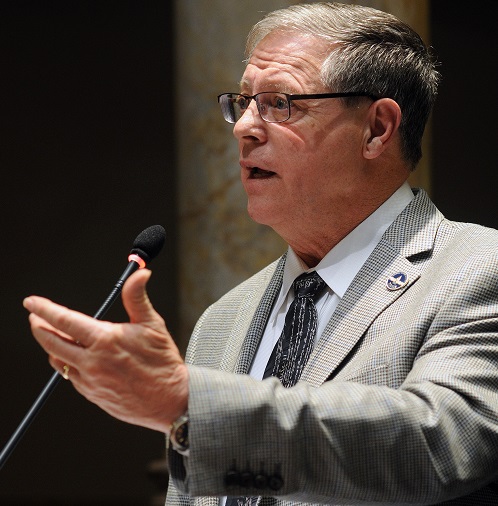FRANKFORT, KY – A bill that would change the personal injury protection (PIP) coverage required in all Kentucky automobile insurance policies has passed the state Senate.

Sen. Rick Girdler, R-Somerset, presenting Senate Bill 121
Sen. Rick Girdler, R-Somerset, said he introduced the measure, known as Senate Bill 121, to stop very specific abuses in PIP, intended for those injured in automobile wrecks to quickly be reimbursed for medical bills and lost wages without regard to who was at fault. SB 121 passed yesterday by a 21-16 vote.
“As an insurance agent, I’ve had the opportunity to see the impact of insurance fraud and abuses firsthand,” Girdler said. He added that since legislators voted to require PIP in the ‘70s, structural flaws in state statutes and adverse court decisions have combined to make PIP a “hotbed for abuse of practices and outright fraud.”
He said the state insurance department reported that about 70 percent of fraudulent insurance claims reported in Kentucky are related to PIP.
Girdler said there were two chief problems with PIP. He said the first was that all bills are presumed to be reasonable and required to be paid within 30 days. “This has allowed unscrupulous providers, a small subset of all providers, to engage in abusive practices and outright fraud,” he said.
“Second, unlike workers comp and health insurance, there is no limitation on PIP charges,” Girder said. “It is the only insurance coverage which is billed at retail. As a result, consumers see their $10,000 in benefits used up quickly by charges.”
Sen. Ray S. Jones II, D-Pikeville, spoke against SB 121. He said what’s allowed to be charged for worker compensation claims isn’t enough money to cover most medical providers’ expenses. Jones said the bill would “deny access of care for people who have been in a motor vehicle collision.”
“Really, this is a bill that is another anti-consumer piece of legislation,” he said.
Girdler said SB 121 would limit the types of medical services PIP reimburses to services performed by licensed practitioners or which are designed to serve a legitimate medical purpose. It also would eliminate excessive billing by requiring medical providers to charge the same price as worker compensation claims. Girdler said those amounts are generally lower than the “retail rate” currently being charged in PIP cases.
An amendment, however, would allow a hospital to charge more than what’s required in worker compensation claims but less than the retail rate. Sen. Stephen Meredith, R-Leitchfield, who filed the amendment, said that charge would generally be about 20 percent less than the retail rate.









